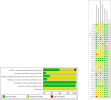Comparing different acupuncture methods for the treatment of chronic fatigue syndrome: a systematic review and network meta-analysis
Rong Li, Yu Zhang, YuHang Xie, XiaoQin Chen
[Line breaks added[
Introduction
Acupuncture involves many different methods that can effectively treat Chronic Fatigue Syndrome (CFS). However, the comparative efficacy of different acupuncture-related methods remains unclear.This study aims to evaluate and rank the effectiveness of various acupuncture therapies for CFS through a network meta-analysis.
Methods
A comprehensive search of the three Chinese and four English databases for randomized controlled trials evaluating the use of acupuncture in treating CFS, published from database inception to July 2025, was performed. Focusing on FS-14 scores and total effective rates as primary and secondary outcomes, respectively. Bayesian network meta-analysis was used to compare the effectiveness of 9 different intervention methods.
Results
Thirty-five randomized controlled trials comprising 2383 participants were included.
Pairwise comparison revealed that moxibustion (mean difference [MD]: 12.43, 95% confidence interval [CI]: 4.03 to 21.14) and acupuncture (MD: 11.15, 95% CI: 3.3 to 19.39) were more effective than Western medicine in improving FS-14 scores.
Regarding the total effective rate, the therapeutic effect of moxibustion is superior to that of acupuncture (risk ratio [RR]: 0.82, 95%CI: 0.74 to 0.9) and Western medicine (RR: 1.5, 95%CI: 1.33 to 1.71). The SUCRA ranking results revealed that regardless of FS-14 score or total effectiveness, moxibustion yielded the first curative effect.
Conclusion
Moxibustion may be advantageous in alleviating the fatigue symptoms of patients with CFS. However, the number of included studies was limited, and high-quality research is needed to confirm our conclusions.
Protocol registration
PROSPERO: CRD42024534790
Web | PDF | European Journal of Integrative Medicine | Open Access (Journal Pre-proof)
Rong Li, Yu Zhang, YuHang Xie, XiaoQin Chen
[Line breaks added[
Introduction
Acupuncture involves many different methods that can effectively treat Chronic Fatigue Syndrome (CFS). However, the comparative efficacy of different acupuncture-related methods remains unclear.This study aims to evaluate and rank the effectiveness of various acupuncture therapies for CFS through a network meta-analysis.
Methods
A comprehensive search of the three Chinese and four English databases for randomized controlled trials evaluating the use of acupuncture in treating CFS, published from database inception to July 2025, was performed. Focusing on FS-14 scores and total effective rates as primary and secondary outcomes, respectively. Bayesian network meta-analysis was used to compare the effectiveness of 9 different intervention methods.
Results
Thirty-five randomized controlled trials comprising 2383 participants were included.
Pairwise comparison revealed that moxibustion (mean difference [MD]: 12.43, 95% confidence interval [CI]: 4.03 to 21.14) and acupuncture (MD: 11.15, 95% CI: 3.3 to 19.39) were more effective than Western medicine in improving FS-14 scores.
Regarding the total effective rate, the therapeutic effect of moxibustion is superior to that of acupuncture (risk ratio [RR]: 0.82, 95%CI: 0.74 to 0.9) and Western medicine (RR: 1.5, 95%CI: 1.33 to 1.71). The SUCRA ranking results revealed that regardless of FS-14 score or total effectiveness, moxibustion yielded the first curative effect.
Conclusion
Moxibustion may be advantageous in alleviating the fatigue symptoms of patients with CFS. However, the number of included studies was limited, and high-quality research is needed to confirm our conclusions.
Protocol registration
PROSPERO: CRD42024534790
Web | PDF | European Journal of Integrative Medicine | Open Access (Journal Pre-proof)

